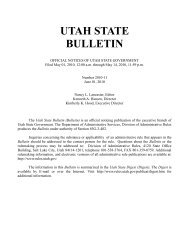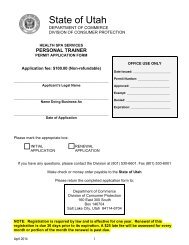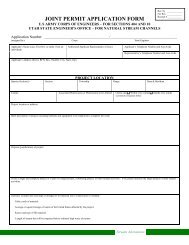Vol. 2007, No. 15 (08/01/2007) PDF - Administrative Rules - Utah.gov
Vol. 2007, No. 15 (08/01/2007) PDF - Administrative Rules - Utah.gov
Vol. 2007, No. 15 (08/01/2007) PDF - Administrative Rules - Utah.gov
You also want an ePaper? Increase the reach of your titles
YUMPU automatically turns print PDFs into web optimized ePapers that Google loves.
DAR File <strong>No</strong>. 3<strong>01</strong>80<br />
NOTICES OF PROPOSED RULES<br />
constitution or statutory rights regarding concealed weapons<br />
permits, pursuant to UCA 53-5-7<strong>01</strong> et seq.<br />
R5<strong>01</strong>-2-13. Transportation.<br />
A. The program shall have written policy and procedures for<br />
transporting consumers.<br />
B. In each program or staff vehicle, used to transport<br />
consumers, there shall be emergency information which includes at<br />
a minimum, the name, address and phone number of the program<br />
and an emergency telephone number.<br />
C. The program shall have means, or make arrangement for,<br />
transportation in case of emergency.<br />
D. Drivers of vehicles shall have a valid drivers license and<br />
follow safety requirements of the State.<br />
E. Each vehicle shall be equipped with an adequately supplied<br />
first aid kit such as recommended by American Red Cross.<br />
R5<strong>01</strong>-2-14. Categorical <strong>Rules</strong>.<br />
In addition to Core <strong>Rules</strong>, Categorical <strong>Rules</strong> are specific<br />
regulations which must be met for the following:<br />
A. Child Placing Adoption Agencies R5<strong>01</strong>-7,<br />
B. Day Treatment R5<strong>01</strong>-20,<br />
C. Intermediate Secure Treatment Programs for Minors R5<strong>01</strong>-<br />
16,<br />
D. Outdoor Youth Programs R5<strong>01</strong>-8,<br />
E. Outpatient Treatment R5<strong>01</strong>-21,<br />
F. Foster Care R5<strong>01</strong>-12,<br />
G. Residential Treatment R5<strong>01</strong>-19,<br />
H. Residential Support R5<strong>01</strong>-22,<br />
I. Social Detoxification R5<strong>01</strong>-11 and<br />
J. Assisted Living for DSPD Residential R710.<br />
R5<strong>01</strong>-2-<strong>15</strong>. Single Service Program <strong>Rules</strong>.<br />
Core <strong>Rules</strong> of the Office of Licensing do not apply to single<br />
service programs.<br />
Single services program <strong>Rules</strong> are the regulations which must<br />
be met for the following:<br />
A. Adult Day Care, which <strong>Rules</strong> are found in R5<strong>01</strong>-13,<br />
B. Adult Foster Care, which <strong>Rules</strong> are found in R5<strong>01</strong>-17.]<br />
R5<strong>01</strong>-2-1. Authority and Purpose.<br />
This Rule is authorized by Section 62A-2-106, et seq.<br />
This Rule describes the basic health and safety standards all<br />
human services programs, with the exception of foster homes for<br />
children, are required to comply with.<br />
This Rule describes the minimum administration and financial<br />
requirements all human services programs, with the exception of<br />
foster homes for children, are required to comply with.<br />
R5<strong>01</strong>-2-2. Definitions.<br />
(1)(a) "Abuse" includes, but is not limited to:<br />
(i) actual, attempted, or threatened non-accidental harm, to the<br />
physical, psychological, or emotional health of a client;<br />
(ii) the use of confinement, physical restraint, medication, or<br />
isolation that causes or may cause harm to a client;<br />
(iii) the deprivation of treatment, food, or hydration, except as<br />
provided by law;<br />
(iv) causing physical injury or pain, including but not limited to<br />
bleeding, bruising, swelling, dislocation, contusion, laceration, burning,<br />
bone fracture, bodily damage, or death;<br />
(v) corporal punishment, including but not limited to hitting or<br />
slapping;<br />
(vi) domestic-violence-related abuse;<br />
(vii) sexual abuse or sexual exploitation; or<br />
(viii) "severe emotional abuse", "severe physical abuse", or<br />
"emotional or psychological abuse", as these terms are defined in<br />
sections 62A-4a-1<strong>01</strong> and 62A-3-3<strong>01</strong>.<br />
(b) Abuse does not include:<br />
(i) reasonable discipline of a client in accordance with the<br />
licensee's policy and procedure manual that has been approved by<br />
the Office of Licensing;<br />
(ii) withholding a client's privileges; or<br />
(iii) the use of reasonable and necessary physical restraint or<br />
force in self-defense, in defense of others, or to protect the client.<br />
(2) "Adult" means an individual who is 18 years of age, or<br />
older.<br />
(3) "Adult day care" is defined in Section 62A-2-1<strong>01</strong>.<br />
(4) "Background screening clearance" means written<br />
verification that the Office of Licensing has approved an applicant's<br />
criminal, abuse, neglect, and exploitation background screenings.<br />
(5) "Behavior Consultant" is a professional certified by The<br />
Division of Services for People with Disabilities to assess and<br />
develop educational procedures and techniques.<br />
(6) "Bodily fluids" includes but is not limited to blood, saliva,<br />
feces, urine, nasal discharge, or vomit, but does not include tears or<br />
perspiration.<br />
(7) "Chemical restraint" means any drug or substance used to<br />
control a client's behavior or movement that is not prescribed and<br />
monitored by the client's personal physician.<br />
(8) "Child" is defined in Section 62A-2-1<strong>01</strong>.<br />
(9) "Child placing" is defined in Section 62A-2-1<strong>01</strong>.<br />
(10) "Client" is defined in Section 62A-2-1<strong>01</strong>.<br />
(11) "Communicable disease" is defined in Section 26-6-2.<br />
(12) "Competency and proficiency requirements" are the<br />
essential skills and abilities that must be demonstrated by staff, as<br />
assessed in a written performance evaluation by the staff's<br />
supervisor.<br />
(13) "Day treatment" is defined in Section 62A-2-1<strong>01</strong>.<br />
(14) "Dangerous weapon" includes but is not limited to<br />
"firearms", "antique firearms", "explosive, chemical, or incendiary<br />
devices", ammunition, and other items as defined in Sections 76-10-<br />
306 and 76-10-5<strong>01</strong>.<br />
(<strong>15</strong>) "Direct access" is defined in Section 62A-2-1<strong>01</strong>.<br />
(16) "Direct care staff" means an individual who provides<br />
educational, vocational, therapeutic, or treatment services;<br />
supervision of a client; or care directly to a client; and does not<br />
include support staff.<br />
(17) "Directly supervised" is defined in Section 62A-2-120.<br />
(18) "Domestic-violence-related abuse" means:<br />
(a) domestic violence; or<br />
(b) a violent physical or verbal interaction between cohabitants<br />
in the physical presence of a child or vulnerable adult, having<br />
knowledge that a child or vulnerable adult is present and may see or<br />
hear an act of domestic violence.<br />
(19) "Domestic violence" is as defined in Section 77-36-1.<br />
(20) "Emotional abuse" is as defined in Section 62A-3-3<strong>01</strong> and<br />
includes but is not limited to conduct that subjects the client to<br />
psychologically destructive behavior, such as making demeaning<br />
comments, threatening harm, terrorizing the client or alienating the<br />
client.<br />
(21) "DSPD" means the Division of Services for People with<br />
Disabilities.<br />
UTAH STATE BULLETIN, August 1, <strong>2007</strong>, <strong>Vol</strong>. <strong>2007</strong>, <strong>No</strong>. <strong>15</strong> 29


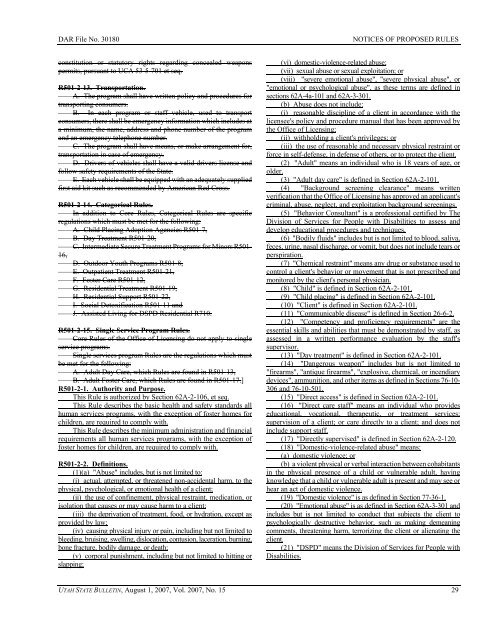
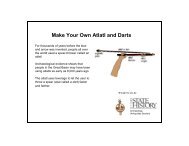
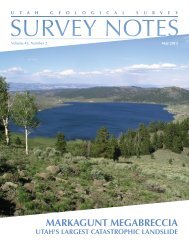
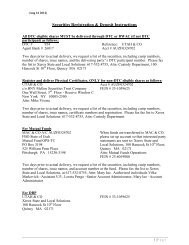
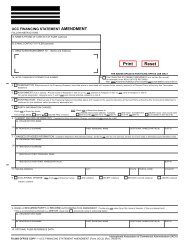
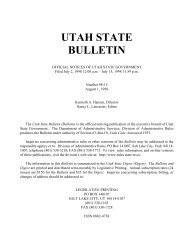
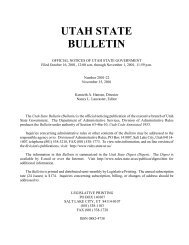
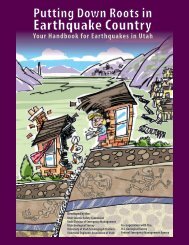
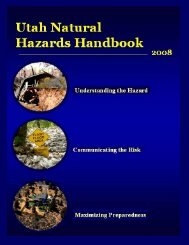
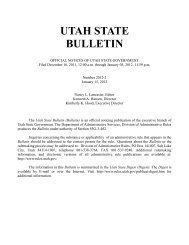
![Lynx avoidance [PDF] - Wisconsin Department of Natural Resources](https://img.yumpu.com/41279089/1/159x260/lynx-avoidance-pdf-wisconsin-department-of-natural-resources.jpg?quality=85)
